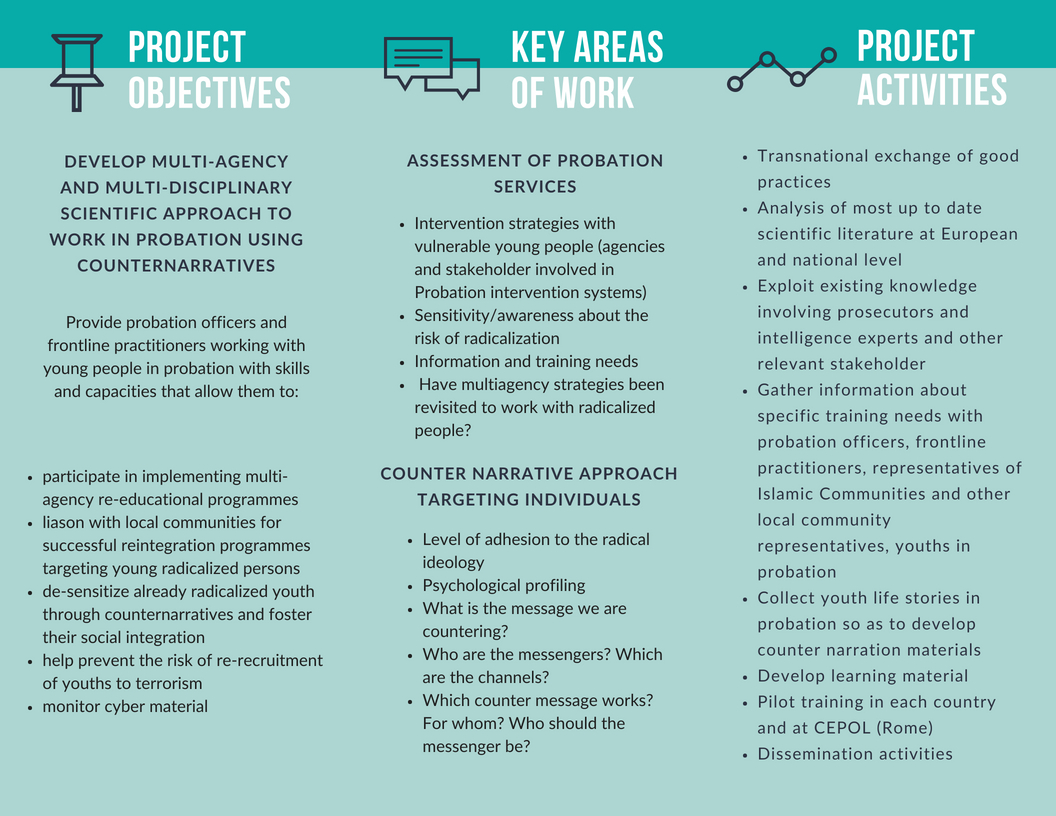Multi-Agency Training Exit Strategies for Radicalized Youth (MATES)
MATES Presentation
FINAL REPORTS & MULTILINGUAL TRAINING TOOLKIT
Overview
Europe is facing one of the most demanding challenges due to the need to defeat radicalization and terrorism: an increasing number of marginalised youth, with migrant background or not, are more and more targeted by, and sensitive to, terrorist speeches and ideology and are exposed to the risk of being actively recruited. Beside prevention and intelligence activities, aimed to arrest and sentence them, there is an increasing need to develop effective re-education programmes (exit strategies) either in jail or in probation and to foster social reintegration by providing equal educational and integration opportunities toward qualified jobs.
Unfortunately, re-education programmes seem not to be effective in ensuring a positive social reintegration of these youth. Failure in reintegrating radicalised youth not only exposes the youth themselves to the risk of being re-recruited, but also ends up diminishing the efficiency of the entire preventive system, as it proves not to be able to ensure the youth’s cooperation in identifying recruiters and offering fundamental inputs to contrast radicalised speech and strategies.
Project aims
The Multi-Agency Training Exit Strategies for Radicalized Youth (MATES) project seeks to respond to the need to improve the efficiency of the re-education system by elaborating a Common Curricula/Training Toolkit with scientific grounded learning material on how to implement adequate exit-strategies and de-sensitization programmes.
This project is funded under the European Commission’s Directorate-General Migration and Home Affairs, Grant Agreement no. HOME/2015/ISFP/AG/LETX/8772. MATES is coordinated by the Psychoanalytic Institute for Social Research (Italy). It will run from November 2016 to April 2018 involving 7 partners (Universities and NGOs) in 6 different European countries.
Methodology
The MATES project will develop a multi-agency and multi-disciplinary approach, which combines psychological, legal, criminological and sociological skills, so that professionals with different background, frontline practitioners and community stakeholders (e.g. Imams) can learn how to work together based on a coherent strategy to improve the chances of radicalized youths to full reintegration in society. Besides fostering the social integration of youths with a terrorist background, the programme will increase the chances that these youths contribute to prevent and tackle terrorism, and help prevent the risk of re-recruitment of youths to terrorism as a way to stop people becoming terrorists or supporting terrorism.
It is widely acknowledged that Probation is one of the best contexts to implement programmes that favour a positive disengagement of youth from terrorism. The project will directly involve youths in probation or youths with a radicalized background, probation officers, frontline practitioners and Islamic community stakeholders in both research and training activities. In this way specific training needs will be collected that will contribute to plan a tailored de-sensitization project based on counter-narratives (deterring youths from engaging in terrorist acts) as well as narratives and relevant material that will help adapt project intervention strategies and approaches.
The MATES project will rely on already existing knowledge involving porsecutors and intelligence experts and other relevant stakeholders in developing training materials. MATES will refer to the most up to date scientific literature about the psychological approaches that can help explain the mechanisms involved in building a terrorist personality and describe the profiles of the youth involved. MATES will research psychological instruments which can help evaluate the level of adhesion to the terrorist ideology and the main factors that motivate the youths to become terrorists. Equally important, MATES will collect youth life stories in probation so as to develop counter narration materials as an effective tool to de-sensitize radicalized youths
Based on this, the MATES project will develop a Common Curricula / Training Toolkit, that will be tested with probation officers and frontline practitioners, and training guidelines to be used in all partner countries (all the material will be available in 6 languages). The professionals who will be actively involved in project activities (probation officers and frontline practitioners) need to be adequately trained in order to accomplish such a demanding task.
A wide dissemination strategy will be developed relying on academic pathways, brochures’ development and project website, that will be continually updated, as well as the cooperation of the Ministries of Justice and the involvement of representatives of Islamic communities and other community representatives.
|
|||||||||||||||||||||||
|
|||||||||||||||||||||||
|
|||||||||||||||||||||||
IPRS has been invited to present the MATES project at the European Parliament on the 29 of November, 2017 during the seminar entitled “Achieving long-term security in our societies: Challenging radicalization between prevention and social reintegration “.
Achieving long-term security in our societies: Challenging radicalisation between prevention and social reintegration
29 November 2017, European Parliament, Bruxelles













